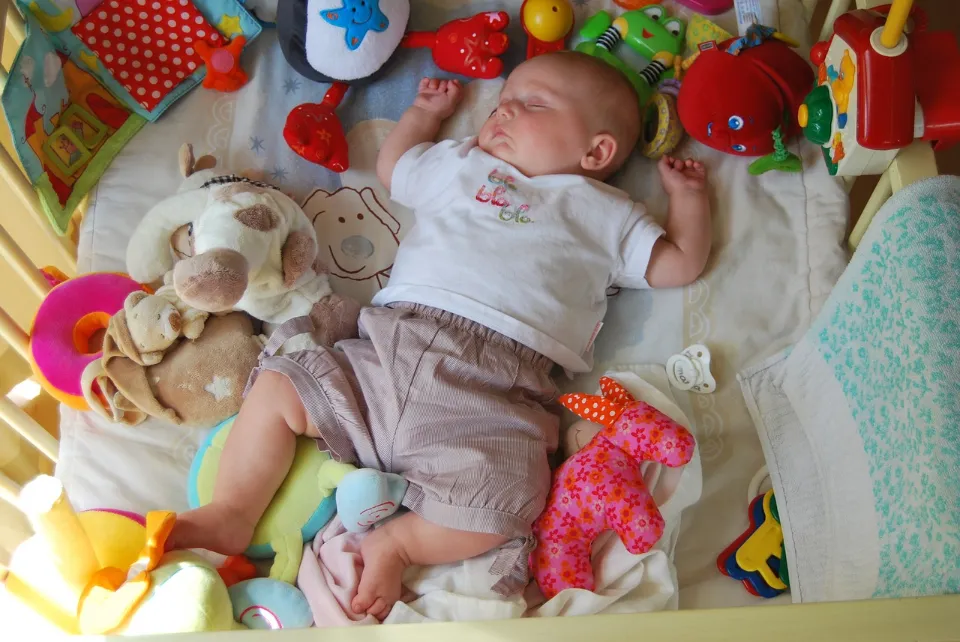
Should I Wake My Newborn to Feed at Night – To Wake or Not to Wake
With a newborn, the first few days and nights can be challenging, especially when it comes to establishing feeding schedules. The decision of whether to wake a sleeping baby for a nighttime feeding or to leave them alone is one that new parents frequently face.
To offer information and suggestions for making a wise choice, we will examine this subject in-depth in this article. We’ll assist you in deciding whether to wake up your newborn or let them sleep by examining their nutritional requirements, sleep patterns, and any potential effects on growth and development.
Understanding your baby’s cues and needs is crucial to ensuring their well-being because every baby is different. Let’s go on this journey together and learn the best way to feed your precious newborn at night.
How Long Will My Newborn Sleep?

According to the National Sleep Foundation, newborns should sleep between 14 and 17 hours per day. Some newborns may snooze for as many as 18 to 19 hours every day.
Each time they need to eat, newborns wake up. Every two to three hours on average, breastfed babies eat. Babies who are bottle-fed typically have fewer feedings every 3–4 hours.
Longer-sleeping newborns should be awakened so they can feed. A good weight gain, which typically occurs within the first few weeks, requires waking your baby every three to four hours so that he or she can eat. It’s safe to allow your baby to sleep longer stretches at night after that.
Parents may wake up frequently at night to tend to their newborn during the first few months of the baby’s life, which can be particularly difficult. Every infant has a different sleeping schedule. Some start to sleep “through the night” (for 5–6 hours at a time) by 2–3 months of age, but some don’t.
Times to Wake Your Newborn Baby to Feed Them

To make sure their baby is eating enough, new parents frequently wake up their infant. It is also recommended for mothers who are nursing so that the baby is at the breast frequently enough for the body to know to continue producing more milk. In addition to feeding your baby every three hours (including waking them to do so), be sure to always keep an eye out for other indications that your baby is getting enough to eat.
When Your Doctor Advises It
Before discussing the main justifications for waking a sleeping child to feed them, we want to make clear that whatever your doctor tells you is final. The pediatrician of your child should be contacted if you are uncertain about anything that is happening to your infant. They will give you advice on what is best for your individual situation and that of your infant, which may include requesting that you wake your child more or fewer times than is typically recommended.
Before Your Baby Has Regained His Birth Weight

According to Kids Health, within the first few days of life, babies typically lose between 7 and 10% of their birth weight. Because a baby is carrying extra fluid when they are born, this is normal. A baby should regain this by their two-week appointment if they are growing at the average rate of one ounce per day. Giving your baby the calories they require to thrive and continue to grow steadily as expected is your responsibility up until that point. Your baby will have plenty of chances each day to meet their calorie needs if you don’t let them sleep for more than three hours at a time (yes, even at night).
To Establish Breastfeeding
All of breastfeeding is a supply and demand situation. Your body produces it in response to your baby’s needs. You must breastfeed your child continuously to ensure a steady supply of milk for your child. This will ensure that your body continues to receive the signal that it needs to produce more milk. In those first few weeks, make sure to wake the baby up every three hours to feed. Never forget that you can never nurse too much!
How Long Should You Let Your Newborn Sleep Without Eating?
Several variables affect how long you can let your baby go between feedings. Here are some to consider:
Your baby’s age
Until breastfeeding is established and a full-term baby has gained back their birth weight, they should be fed every three hours. A newborn should not sleep for more than 4-5 hours at a time. Naturally, if your doctor has given you the go-ahead to let your child sleep for longer periods of time, then you should heed that advice. In order to find out how long you should let your baby go between feeds if your baby is a preemie or you have any other concerns, we suggest getting in touch with your doctor.
Your baby’s weight gain

The nurse will probably ask you to feed your child every three hours while you’re in the hospital. Additionally, when they send you home with your new child, they give you this instruction. This is ideally what you should do up until your baby’s 2-week check-up because that is when they can tell if your baby is gaining weight at the appropriate rate. Being at this stage is a major accomplishment for a baby as well as for you because it means that, now that they are getting nice and chubby, you can allow your child to sleep for longer stretches of time (about 4 to 5 hours). Weight measurements will continue to be “taken throughout your baby’s first year, and if baby is struggling to put on enough weight again, the doctor may advise you to feed more often again.
Whether you’re breastfeeding or formula feeding
Formula-fed infants can typically go longer intervals between feedings than breastfed infants. This is due to the fact that breastmilk digests more quickly than formula. However, you still need to follow the “feed every three hours” rule until your doctor has given the go ahead for longer stretches. After that, it’s normal to let a formula-fed baby go a little longer between feeds than a breastfed baby (as long as they have enough wet diapers and are gaining weight properly, of course).)
What Can I Do If My Newborn Doesn’t Want to Eat, Just Sleep All Day?
There are a few reasons you might see a newborn baby who doesn’t seem interested in eating during the day:
- We want to concentrate on resolving day-night confusion if your newborn appears to sleep during the day and be awake during the night.
- Let’s discuss how to assist your sleepy eater if your newborn consistently seems to doze off during those crucial daytime feedings.
- We may need to correct your newborn’s reverse cycling and really focus on full feedings during the day if it appears that they are waking up every hour or two to eat throughout the night.
If your baby seems lethargic and difficult to wake up, or if you have any questions about their general intake, please consult your pediatrician.
Conclusion
There is no denying that the first few weeks with a newborn are difficult. And it can be difficult to wake up on your own to wake up your sleeping child when you are already so exhausted. But keep reminding yourself that it’s temporary and that as the weeks go on and your doctor keeps giving you the green light, you’ll be able to let your baby sleep to their heart’s content and feed them when they “demand” it.





Average Rating